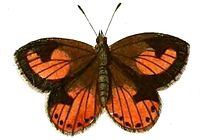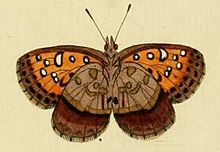Aloeides pierus, the dull copper, is a butterfly of the family Lycaenidae. It is found in South Africa, where it is found in the Western, Northern and Eastern Cape, as well as the Free State.
| Aloeides pierus | |
|---|---|

| |

| |
| Scientific classification | |
| Domain: | Eukaryota |
| Kingdom: | Animalia |
| Phylum: | Arthropoda |
| Class: | Insecta |
| Order: | Lepidoptera |
| Family: | Lycaenidae |
| Genus: | Aloeides |
| Species: | A. pierus
|
| Binomial name | |
| Aloeides pierus | |
| Synonyms | |
| |
Description
editThis butterfly species inhabits grassy areas with bare patches, such as grassy fynbos in the western and eastern cape, or highvield grasslands in other provinces.[3]
The wingspan is 25–30 mm (0.98–1.18 in). Adults are on wing from September to April, with peaks in October and February. There are multiple generations per year. There are 12 veins on forewing, while hindwing lacks tail.[4][5]
The males of Aloeidis exhibit territorial behavior, claiming specific areas on road verges and unsurfaced roads where they can counter females and mate.[6]
Chinitinous spicules are present at the distal end of tibia in a f-f-a configuration, with a well-developed spur at the lower extremities. Males have a sharp foretarsal claw. A. pierus feature long palpi, a robust thorax, and a mesofur almost twice the length of tibia. Females lack dense tuft of specialized scales on their abdomen.[5]
The genitalia are very similar among species of this genus, and not very useful when distinguishing. The uncus is in the form of a narrow strip, overlaying the large tegumen, with its distal edge slightly convex when flattened, while the subunci are short and exhibit bulging at their bases. The tegumen extends proximally to the eighth abdominal segment. There adeagus is short with slight dorsal swelling, curving slightly downwards. It features some lateral fine spines on its external region. There are oblong valves containing broad, rounded finger-like apices. The juxta is triangular, notched medially and the saccus is small and rounded.[5]
Habitat and behavior
editThe Dorsal Nectary Organ (DNO) develops in larvae later stages, mostly the third and subsequent instars.[7]
The larvae feed on Aspalathus species. They shelter in the nests of Lepisiota capensis ants during the day.
References
edit- ^ Henning, G.A. (2020) [amended version of 2020 assessment]. "Aloeides pierus". IUCN Red List of Threatened Species. 2020: e.T161282692A175062805. doi:10.2305/IUCN.UK.2020-2.RLTS.T161282692A175062805.en. Retrieved 8 August 2021.
- ^ Aloeides at Markku Savela's Lepidoptera and Some Other Life Forms
- ^ Henning, G.A. (1993). "Revisional notes on the genus Aloeides Hübner". Metamorphosis. 4: 144–155.
- ^ Woodhall, Steve (2005). Field Guide to Butterflies of South Africa. Cape Town, South Africa: Struik. ISBN 978-1-86872-724-7.
- ^ a b c Heath, Alan (1997). "A review of African genera of the tribe Aphnaeini (Lepidoptera: Lycaenidae)". Metamorphosis (Occasional Supplement Number 2). ISSN 1027-0787.
- ^ Edge, David A. (2005). "Life history and ecological observations on Aloeides pallida, undesribed subspecies (Lepidoptera: Lycaedinae)". Metamorphosis. 16 (4): 110–115.
- ^ Clark, G.C.; Dickson, C.G.C. (1971). Life Histories of the South African Lycaenid Butterflies. Purnell. p. 272.
